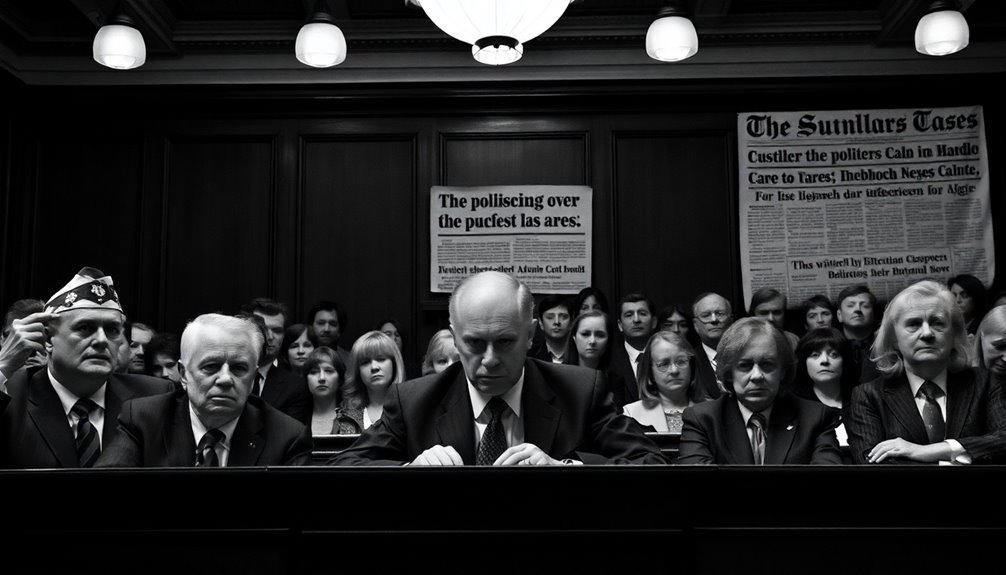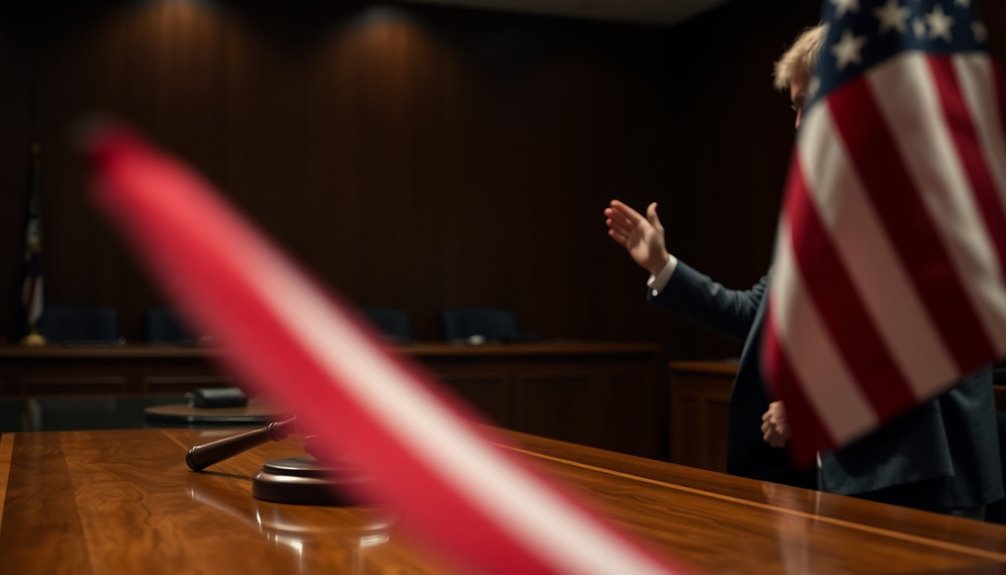Critics are raising alarms over the recent decision to drop corruption charges against NYC Mayor Eric Adams, especially given the timing with his reelection campaign. Many see this as a political maneuver influenced by the Trump administration, which erodes trust in the justice system. Allegations of campaign finance violations and lavish perks raise further questions about accountability. If you continue following this story, you'll uncover more about the implications for both Adams and the justice system.
Key Takeaways
- Critics allege the Justice Department's decision to drop charges against Adams reflects political favoritism linked to the Trump administration.
- The timing of the decision raises suspicions of strategic support for Adams' reelection campaign, undermining legal integrity.
- Resignations within the Justice Department signal dissent over perceived political influence in prosecutorial actions against Adams.
- Legal experts warn this case exemplifies a troubling trend that could erode public trust in the justice system's independence.
- Ongoing investigations into Adams suggest serious legal implications, highlighting concerns about accountability in American politics.

While the Justice Department's decision to drop corruption charges against NYC Mayor Eric Adams might seem like a political maneuver, it raises serious concerns about the integrity of the justice system. Critics argue that this intervention prioritizes political considerations over legal accountability. The decision, made just as Adams faces reelection, suggests that the timing was deliberately crafted to shield him from the repercussions of ongoing investigations into bribery, conspiracy, and campaign finance violations.
Adams pleaded not guilty to all charges, which included accepting illegal campaign contributions and lavish travel perks from foreign nationals. By ordering prosecutors to drop the case, the Justice Department appears to have sidestepped its usual procedures, a move that's alarmed many observers. Some see this as a troubling precedent, potentially allowing political alliances to dictate legal outcomes. The resignations of senior Justice Department officials in protest further highlight the internal dissent regarding this order.
This situation reflects broader tensions between the Trump administration and Democratic officials. Trump's public support for Adams raises eyebrows, suggesting an alignment that critics argue may have influenced the decision to dismiss the charges. Such allegations of political favoritism paint a picture of a justice system that's being weaponized for political gain, undermining its independence and integrity. Additionally, several senior Justice Department officials resigned in protest over the order to drop the case, further indicating the discontent within the department.
Legal experts warn that this action could erode public trust in the justice system, raising ethical concerns about the motives behind such a significant departure from standard legal procedures. The implications for the future are concerning; if the Justice Department can dismiss charges based on political affiliations, it sets a dangerous precedent for future political interventions in legal matters.
As the drama of the Adams case intensifies, it becomes increasingly clear that the integrity of the justice system hangs in the balance. You should question whether this case signals a troubling trend that could undermine the rule of law and accountability in American politics.
Frequently Asked Questions
What Is the Adams Case About?
The Adams case revolves around New York City Mayor Eric Adams facing bribery charges.
It's alleged that he accepted bribes from Turkish officials. This legal battle has sparked significant controversy, leading to resignations within the Justice Department.
Adams' legal team argues the charges are baseless, calling them a "sham."
The case's unfolding raises questions about political motivations and the integrity of the justice system, impacting public perception and trust.
Who Are the Key Players in the Adams Case?
In a case swirling with intrigue, you'll find key players like New York City Mayor Eric Adams, accused of corruption, and Danielle Sassoon, the acting U.S. Attorney who resigned in protest.
Emil Bove, the acting Deputy U.S. Attorney General, ordered the case's dismissal.
Adams' defense attorney, Alex Spiro, stands ready to fight.
Meanwhile, Pam Bondi, the U.S. Attorney General, plays a pivotal role in the unfolding drama, shaping the case's future.
How Has Public Opinion Shifted Regarding the Adams Case?
Public opinion on the Adams case has shifted significantly.
You might notice many people now view it through a lens of political bias, believing that decisions are driven more by politics than by justice.
Increasing skepticism about corruption has prompted debates on the need for impartiality in legal matters.
As calls for independent investigations grow, the controversy surrounding the case could influence future political campaigns, particularly in New York City.
What Are Potential Outcomes of the Adams Case?
The potential outcomes of the Adams case include the possibility of reopening the investigation after the 2025 election if new evidence surfaces or political dynamics shift.
Local prosecutors might take over, focusing on state or city laws. This could lead to different legal repercussions compared to federal charges.
Additionally, the case's dismissal might affect Adams' political standing, influencing his campaign strategy and how he navigates legal challenges moving forward.
How Can the Public Support Legal Reform Related to This Case?
You can support legal reform by educating yourself and others about the justice system and your legal rights.
Engage in community discussions to raise awareness and organize protests or petitions to amplify your voice.
Support legal advocacy groups that focus on reform, and collaborate with lawmakers to draft policy changes.
Use social media to spread information and mobilize support, ensuring that the call for reform resonates widely and effectively within your community.
Conclusion
In the unfolding drama of the Adams case, it's clear that the line between justice and politics can blur. Critics argue the Trump administration's actions might've crossed that line, raising serious questions about the integrity of our justice system. As the saying goes, "You can't unscramble the eggs." Once trust is broken, it's tough to rebuild. The implications of this case will echo far beyond the courtroom, reminding us all to safeguard our justice system fiercely.










